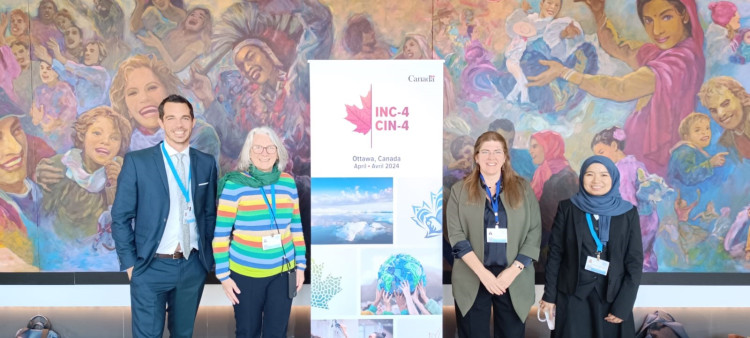An estimated 11 million tonnes of plastic enter the global ocean each year. Once in the ocean, these plastics can degrade and break apart into microplastics, tiny plastic particles smaller than 5 millimetres in size. Difficult to track due to their size and complex to characterize, microplastics pose a particular threat to the marine environment and human health. The IAEA’s NUclear TEChnology for Controlling Plastic Pollution (NUTEC Plastics) initiative works to address this gap in knowledge and support national, regional and global efforts to advance research and build capacity in microplastics analysis.
At the 2024 UN Ocean Decade Conference the IAEA focused on practical ways to address marine microplastic pollution. Florence Descroix-Comanducci, Director of the IAEA Marine Environment Laboratories, announced NUTEC Plastics’ commitment to the UN Decade of Ocean Science for Sustainable Development: “The IAEA Marine Environment Laboratories are committed to registering NUTEC Marine Plastics Monitoring and Assessment Project as a UN Ocean Decade Action. The ocean is one of our most valuable natural resources, and it is imperative that we take the necessary steps to protect it from the variety of impacts plastic pollution can have.”
The IAEA’s unique expertise in nuclear applications can significantly contribute to both mitigation (by using radiation technology for waste recycling) and monitoring (by using isotopic techniques to monitor and assess impacts of microplastic pollution). The IAEA has been working with countries since 2021 under the NUTEC Plastics initiative to tackle plastic pollution by building capacity and develop solid networks among national laboratories to spur global action and evidence-based policy.
The UN Ocean Decade seeks to accomplish seven outcomes in pursuit of supporting the global ocean: a clean, healthy and resilient, productive, predicted, safe and accessible ocean, in accordance with its vision, “The science we need for the ocean we want.” At this year’s Ocean Decade conference, held in Barcelona, participants identified future priorities for ocean knowledge and science generation to be fulfilled via the Ocean Decade framework.
As a registered UN Ocean Decade action, the NUTEC Plastics initiative will address three challenges set out by the Ocean Decade framework. These are: to understand and beat marine pollution; protect and restore ecosystems and biodiversity; and help develop greater capacity to fight plastic pollution. Part of an effort to stimulate ocean science and knowledge generation, IAEA’s commitment will contribute to advancing ocean science and facilitating collaboration among scientists and stakeholders with the ultimate goal of achieving the aims of the UN Ocean Decade.
NUTEC Plastics is an initiative that is really intrinsically centred in serving our Member States. Plastic pollution is a problem that affects the globe in its entirety which requires a global and collaborative approach to both assess the issue and develop mitigation methods and potential solutions, using nuclear and nuclear-derived technologies.







